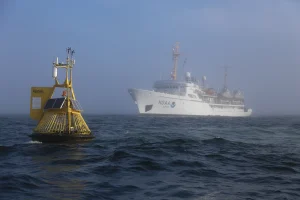SOARCE Webinar
From May 3rd- 6th, 2016 scientists and communicators from around the world gathered to discuss the latest in ocean acidification science at the “Our Ocean in a High CO2 World International Symposium” in Hobart, Tasmania. There was dedicated time at the symposium to understand how ocean acidification science is being connected to education and outreach efforts. During this webinar scientists and communicators will be sharing the scientific highlights along with the latest in communication tools. With this information in hand, participants will be able to more effectively share the science of ocean acidification, potential impacts, and positive actions that can be taken with our communities.
About the Speakers:


Dr. Gledhill serves as the Deputy Director of the NOAA Ocean Acidification Program office in Silver Spring, MD. Previously he was an associate scientist with the UM/RSMAS Cooperative Institute of Marine & Atmospheric Sciences (CIMAS) with NOAA’s Atlantic Oceanographic & Meteorological Laboratory Ocean Chemistry Division where he advanced ocean acidification research primarily related to monitoring and understanding the process of ocean acidification within coral reef ecosystems. He was instrumental in establishing the NOAA Coral Reef Conservation Program (CRCP) Atlantic Ocean Acidification Test-bed (AOAT) in La Parguera, Puerto Rico, and recently another test-bed within the Florida Keys National Marine Sanctuary. He also has worked on the development of a satellite-based ocean acidification data synthesis product for the Greater Caribbean Region that scales up discrete ship-based observations of surface ocean carbonate chemistry. The model produces synoptic monthly fields of carbonate chemistry including aragonite saturation state and CO2 partial pressure that can be used to track regional and seasonal changes in carbonate chemistry related to ocean acidification and can be accessed at NOAA Coral Reef Watch. Gledhill has also been contributor to numerous strategic planning documents related to ocean acidification within NOAA including leading the development of the Southeast/GOM Regional Strategic Plan on ocean acidification and CRCP OA science plan. Gledhill received his M.S. and Ph.D. from the Department of Oceanography at Texas A&M University in 2005 where he primarily investigated carbonate mineral kinetics in complex electrolyte solutions as well the sediment biogeochemistry associated with methane clathrates in the Northern Gulf of Mexico.


Dr. Libby Jewett became the founding Director of the NOAA Ocean Acidification Program in May 2011, and has been busy ever since building, organizing and steering the NOAA OAP enterprise. As a founding member of NOAA's Ocean Acidification Steering Committee, convened first in 2007, Jewett co-led NOAA-wide meetings of scientists and policymakers to conceive and develop NOAA's first comprehensive ocean acidification research plan. She chairs the Ocean Acidification Interagency Working Group (under the Subcommittee on Ocean Science and Technology) where she helped develop an ocean acidification strategic research plan for the nation. She is co-chair of the Executive Council of the newly formed Global Ocean Acidification Observing Network. Prior to becoming Director, she directed the only two national competitive hypoxia research funding programs as program manager for the Center for Sponsored Coastal Ocean Research in NOAA's National Ocean Service. Jewett earned a Ph.D. in Biology with a focus on Marine Ecology at the University of Maryland, a Master of Public Policy at Harvard University's Kennedy School of Government, and a B.A. at Yale University.
Sarah-Mae Nelson, Conservation Interpreter at the Monterey Bay Aquarium, trains staff and volunteers how to interpret climate change, ocean acidification and other conservation messages to the public. Sarah-Mae is also the Online Community Manager for ClimateInterpreter.org. She works with several NOAA-funded and NSF-funded grant helping to develop a comprehensive, integrated suite of informal educational activities, focused on aspects of climate change and ocean acidification. In 2015, she was recognized as a White House Champion of Change in Climate Education and Literacy.
|
|




